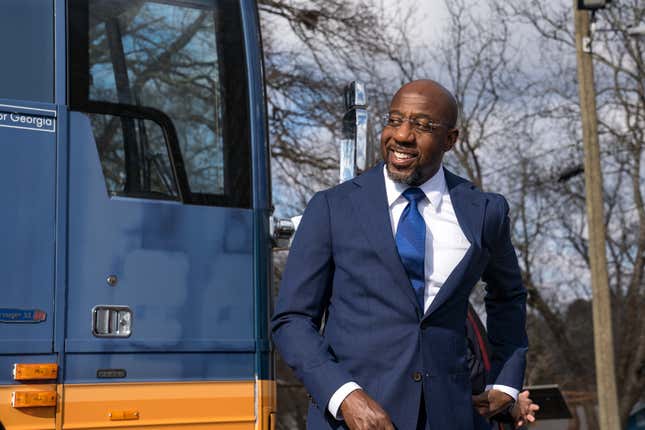
Rev. Raphael Warnock became the first Black senator elected out of Georgia, but another senator who once held his seat believed men like him should be lynched. In October of 1922, Rebecca Latimer Felton was appointed to the U.S. Senate out of the state of Georgia for one full day. She was a leading voice for white women’s suffrage and an ardent white supremacist who regularly called for violence against Black men.
She said in an 1897 speech that “If it needs lynching to protect women’s dearest possession from the ravening human beasts — then I say lynch, a thousand a week, if necessary.” After she married at age 18, she and her husband moved to Cartersville, Ga., to run the family business: a slave plantation.
In her only speech on the Senate floor, in 1922, Felton spoke on behalf of white women’s suffrage, saying “there may be but very few [women senators] in the next few years,” but predicted that “when the women of the country come in and sit with you . . . you will get ability, you will get integrity of purpose, you will get exalted patriotism, and you will get unstinted usefulness.”
Nearly 100 years after that speech, it would be Black women whose organizing led to the first Black person ever elected to the U.S. Senate out of Georgia—by defeating Kelly Loeffler, a white woman who is a Trump supporter and defiantly spoke out against the Black Lives Matters movement. Also do not forget that it was Stacey Abrams who was suggested to run for the seat, but she declined and recommended to Sen. Chuck Schumer that he should consider Warnock instead. Black players on the WNBA team Loeffler co-owns defied her by supporting her opponent, all while sporting Black Lives Matter movement T-shirts.
Warnock’s win comes after some very careful political and verbal calculations of how to defend himself against Loeffler’s attacks. Politico reported recently that Warnock’s team was mindful of how a Black man would appear pushing too hard against a white woman in the South. Instead, he went with ads with cute dogs pointing to Loeffler’s bullshit. Warnock’s slim victory is above the 0.5 threshold needed to trigger a recount in Georgia, so he will be ready to head to Washington, D.C., immediately. Jon Ossoff and Sen. David Perdue’s race is still ongoing, with the 33-year-old challenger in the lead—barely. He is expected to win because the majority of votes outstanding are in mostly Democratic districts.
Warnock’s win puts the Democrats one seat closer to consolidating a 50-50 power balance that Vice President-elect Kamala Harris will break with her vote as president of the Senate. It will also neutralize Senate Majority Leader Mitch McConnell’s ability to obstruct Joe Biden’s appointments and policy objectives, because he will now become the minority leader (Democratic Sen. Chuck Schumer is in line to be the new majority leader). They will have to move fast on their policy objectives because, unlike Ossoff, if he wins, Warnock isn’t serving a full term. The senator-elect is finishing the rest of Johnny Isakson’s term, which ends January of 2023.
Democrats desperately need Warnock’s stature in the chambers of the Senate, given he is the leader of Dr. Martin Luther King Jr.’s church. Warnock is a religious voice from the left who can counter-challenge the white evangelical voices who use faith to support Donald Trump and the GOP’s anti-Democratic and racist governance.
In his victory speech last night, Warnock reminded people of his roots and the Black history that preceded his historic victory.
“A son of my late father who was a pastor, a veteran and a small businessman and my mother who, as a teenager growing up in Waycross, Georgia, used to pick somebody’s else’s cotton,” he said. “But the other day, because this is America, the 82-year-old hands that used to pick somebody else’s cotton went to the polls and picked her youngest son to be a United States Senator.”
Updated, Jan. 6, 2021, 11:01 a.m.: The story has been updated to note that Warnock is not serving a full Senate term.

